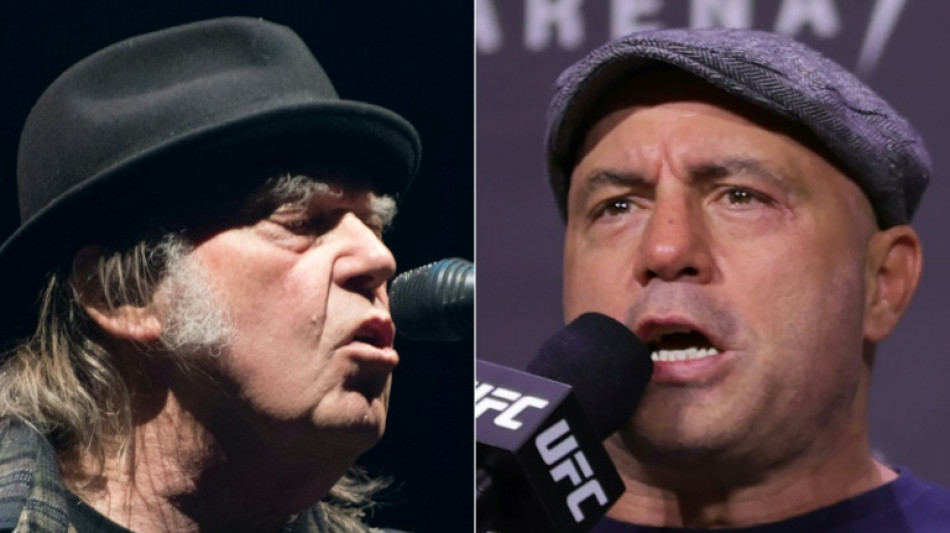Neil Young's ultimatum to Spotify that it choose between his music and the controversial star podcaster Joe Rogan has become a flashpoint in the conversation over online disinformation and corporate responsibility to moderate it.
The prolific rocker this week demanded the streaming giant remove his music -- he had 2.4 million followers and over six million monthly listeners -- unless it was willing to drop Rogan, whose show is the platform's most popular but is widely accused of peddling conspiracy theories.
Rogan, 54, has discouraged vaccination in young people and promoted the off-label use of the anti-parasitic drug ivermectin to treat the virus.
"I realized I could not continue to support SPOTIFY's life threatening misinformation to the music loving public," Young, a polio survivor, said in an open letter.
His challenge followed a demand from hundreds of medical professionals that the streaming service prevent Rogan from promoting "several falsehoods about Covid-19 vaccines," which they said is creating "a sociological issue of devastating proportions."
Rogan, who has a $100 million multi-year exclusive deal with Spotify, was kept on. On Wednesday Young's hits -- including "Heart of Gold," "Harvest Moon" and "Rockin' In The Free World" -- began vanishing from the platform.
The company -- which on Wednesday voiced "regret" over Young's move but cited a need to balance "both safety for listeners and freedom for creators" -- did not respond to an AFP query seeking further comment.
Last year, its CEO Daniel Ek told Axios he didn't think Spotify -- which recently began heavily investing in podcasts -- had editorial responsibility for Rogan.
He compared the podcaster to "really well-paid rappers," saying "we don't dictate what they're putting in their songs, either."
- 'Business concerns' -
Spotify's move drew applause online from organizations including Rumble, a video streaming platform popular with the right wing, which credited the Swedish company with "defending creators" and standing "up for free speech."
But Young, 76, also garnered wide praise for taking a stand, including from the World Health Organization chief. The musician has urged fellow artists to follow his lead.
Summer Lopez, the senior director of the free expression programs at nonprofit PEN America, emphasized that "he's probably one of the only artists who could really afford to make this kind of call."
"He has every right to do that," said the advocate at PEN, an organization dedicated to defending free speech. But she voiced concern over "broader calls for boycotting of Spotify," because "it is such an essential venue for artists to reach their audiences, and a source of income."
The role of platforms like Spotify to moderate content is complex, Lopez said, because unlike social media outlets it's a service "designed primarily to amplify art and artwork."
"I think the real issue here is that Spotify doesn't have a clear policy on this," Lopez said.
And she raised questions of whether "there's any meaningful independence" between "the decision-making process and their business concerns."
- 'Mandating more clarity' -
In recent years online media titans including Facebook and YouTube have come under fire for allowing conspiracy theorists to spread their views.
But despite its explosive growth, podcasting has largely flown under the radar.
Valerie Wirtschafter, a senior data analyst at the Brookings Institution who studies contemporary media and political behavior, said that's primarily because "it's such a big and decentralized space."
But she said audio is a particularly potent medium for spreading falsehoods: "There's a sort of personal experience that happens there."
The intimacy of sound combined with the conversational style of podcasts, Wirtschafter told AFP, allows listeners to process information in a way that "potentially makes it a stronger medium for these untruths, for this misinformation, to fester."
And tracking disinformation in a podcast is "kind of like the needle in the haystack," according to Wirtschafter. Episodes of "The Joe Rogan Experience" often fall in the two-to-three-hour range.
Moderation possibilities include disclaimers before episodes, Wirtschafter said, and platforms that host podcasts could also take steps to mediate their algorithms so they aren't "amplifying... harmful content."
Joseph Uscinski, a political scientist specializing in conspiracy theories at the University of Miami, meanwhile cautioned against giving any "tools of censorship" to government to combat disinformation.
"They can be used for benevolent reasons today, but those same tools will be available tomorrow for people who aren't quite as benevolent."
Lopez agreed, but cited a need for "mandating more clarity on how these decisions are being made, how appeals are handled."
"Giving researchers access to understand what the implications of those decisions are," she said, could help "better understand what the impact of different approaches might be."
For his part, Young dismissed accusations of promoting censorship.
"I did this because I had no choice in my heart," he wrote. "It is who I am. I am not censoring anyone."
"I am speaking my own truth."
T.Deshpande--BD
